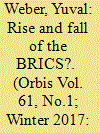| Srl | Item |
| 1 |
ID:
155261


|
|
|
|
|
| Summary/Abstract |
The post-Cold War world defined by the spread of Euro-Atlantic institutions, practices, and values across the rest of the world has come to an end. Russia’s projections of military force abroad, Western populations voting to assert national sovereignty over transnational integration, and the economic powerhouses of Asia, China and India, delivering enviable growth rates all demonstrate that a new political order is in the making.
|
|
|
|
|
|
|
|
|
|
|
|
|
|
|
|
| 2 |
ID:
146259


|
|
|
|
|
| Summary/Abstract |
Nearly 70 years ago, George Kennan wrote his famous long telegram, later published as "The Sources of Soviet Conduct" in Foreign Affairs. Kennan's seminal article integrated material, ideological and historical factors into its analysis, developing a comprehensive and holistic approach to studying the foreign policy of the Soviet Union. Inspired by Kennan's work, this article outlines the structural, domestic, and ideational sources of contemporary U.S. policy towards Russia. These three factors reinforce a dominant narrative among U.S. policymakers that sees the U.S. as defending the status-quo against Russia's revisionist challenge to the post-Cold War international order. They shape the U.S. response to this perceived challenge, preventing the U.S. from seeking out an accommodation with Russia, but also discouraging it from immediately and forcefully confronting the "Russian threat"-even though many powerful domestic constituents lobby for this course of action.
|
|
|
|
|
|
|
|
|
|
|
|
|
|
|
|
| 3 |
ID:
160061


|
|
|
|
|
| Summary/Abstract |
Although a general task of social science is to measure and predict change, international relations (IR) paradigms and theories have been unable to keep up with the rapid pace and destabilizing effects of change in international politics. When addressing Russia, IR's “change problem” becomes clearer: the world's largest country is treated as an object struggling to adjust to changes rather than a protagonist introducing them into the system. Yet, twice within the last quarter century, Russia has acted as a catalyst for changes in international politics that few saw coming and which confounded IR paradigms. The Soviet leadership's decision to withdraw from the Cold War standoff and dismantle its empire in Eastern Europe was one of the most surprising events of the twentieth century. Russia's interventions in Ukraine, Syria, and the 2016 US presidential elections have similarly caught most observers by surprise. IR theories have struggled to account for these actions and have not been able to integrate Soviet/Russian behavior into their larger understanding of change in international politics.
|
|
|
|
|
|
|
|
|
|
|
|
|
|
|
|